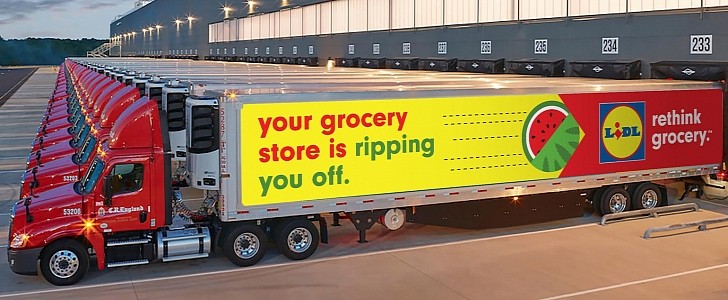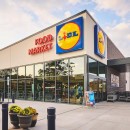Fuel-cell vehicles rely on hydrogen to generate electricity to power an electric motor. Because the energy needs to be converted several times, the efficiency is not great and this is why fuel-cell vehicles (FCVs) are considered inferior to BEVs. But one advantage of fuel-cell vehicles might prove crucial for certain applications, like logistics.
Converting the chemical energy from hydrogen into electrical energy to power an electric vehicle is not the most efficient way. The maximum theoretical efficiency of fuel cells is 60%, but in a vehicle, this leads to a tank-to-wheel efficiency of around 35%. Not great, compared to more than 75% in the case of an electric vehicle.
Despite reduced efficiency, hydrogen fuel cells have advantages that make them better suited for certain applications. For instance, an FCV can be refueled in a couple of minutes, as opposed to the hours it takes a battery to fully charge. This is the main reason why Lidl decided to replace its battery-electric vehicles in its logistics fleet with fuel-cell alternatives.
According to a press release, around 100 forklifts, or 80% of the vehicle fleet in the German retailer’s logistics center in Carquefou, France, operate now on hydrogen. The rest will follow by the end of the year. To power the FCV fleet, Lidl uses 75 kilograms of hydrogen supplied every day from a facility nearby. The hydrogen is produced on spot by a company named Lhyfe using wind energy.
Lidl uses hydrogen-fueled vehicles to replace the forklifts powered by lead-acid batteries that needed several hours to charge. Due to long charging times, those were only available 50% of the time, while the FCVs can be operated 97% of the time.
Most experts consider that the majority of commercial vehicles will be battery-electric in the future, but Lidl proves that hydrogen might be better for certain applications. Not only that, but the German retailer considers the opportunity to convert its delivery truck fleet to operate on hydrogen too. Most probably, in this case, the trucks’ engines would burn the hydrogen directly.
Unlike passenger vehicles, the heavy goods transport sector is still pondering the best technology to use in the future. Tesla works on an electric-powered semi-truck, but there are also fuel-cell trucks in development. And besides those, there are converted engines that can directly burn hydrogen instead of fossil fuels to limit the damage to the environment.
Despite reduced efficiency, hydrogen fuel cells have advantages that make them better suited for certain applications. For instance, an FCV can be refueled in a couple of minutes, as opposed to the hours it takes a battery to fully charge. This is the main reason why Lidl decided to replace its battery-electric vehicles in its logistics fleet with fuel-cell alternatives.
According to a press release, around 100 forklifts, or 80% of the vehicle fleet in the German retailer’s logistics center in Carquefou, France, operate now on hydrogen. The rest will follow by the end of the year. To power the FCV fleet, Lidl uses 75 kilograms of hydrogen supplied every day from a facility nearby. The hydrogen is produced on spot by a company named Lhyfe using wind energy.
Lidl uses hydrogen-fueled vehicles to replace the forklifts powered by lead-acid batteries that needed several hours to charge. Due to long charging times, those were only available 50% of the time, while the FCVs can be operated 97% of the time.
Most experts consider that the majority of commercial vehicles will be battery-electric in the future, but Lidl proves that hydrogen might be better for certain applications. Not only that, but the German retailer considers the opportunity to convert its delivery truck fleet to operate on hydrogen too. Most probably, in this case, the trucks’ engines would burn the hydrogen directly.
Unlike passenger vehicles, the heavy goods transport sector is still pondering the best technology to use in the future. Tesla works on an electric-powered semi-truck, but there are also fuel-cell trucks in development. And besides those, there are converted engines that can directly burn hydrogen instead of fossil fuels to limit the damage to the environment.






